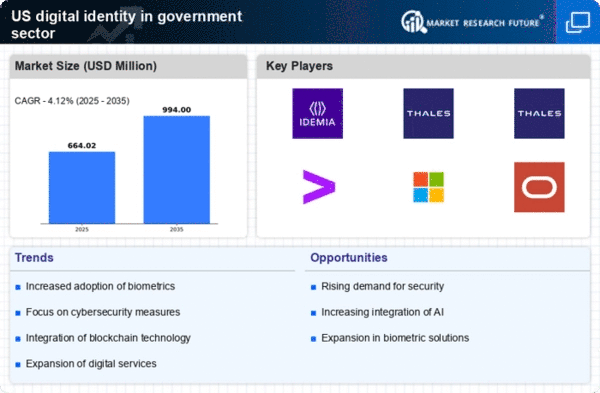Regulatory Compliance and Standards
The digital identity-in-government-sector market is significantly influenced by the evolving landscape of regulatory compliance and standards. Government agencies are increasingly required to adhere to stringent regulations regarding data protection and identity verification. For instance, the implementation of the National Institute of Standards and Technology (NIST) guidelines has become essential for agencies seeking to enhance their digital identity frameworks. Compliance with these standards not only mitigates risks associated with data breaches but also fosters public confidence in government services. As agencies strive to meet these regulatory requirements, the market is expected to witness a growth rate of approximately 12% annually. This focus on compliance drives investment in advanced identity management solutions, ensuring that government entities can effectively navigate the complexities of regulatory landscapes while providing secure and efficient services to citizens.
Growing Demand for Secure Digital Services
The digital identity-in-government-sector market is experiencing a notable surge in demand for secure digital services. As citizens increasingly engage with government services online, the need for robust identity verification mechanisms becomes paramount. Recent data indicates that approximately 70% of citizens prefer digital interactions for government services, highlighting a shift towards online platforms. This trend necessitates the implementation of advanced digital identity solutions to ensure secure access to services, thereby fostering trust in government operations. The market is projected to grow at a CAGR of 15% over the next five years, driven by the need for enhanced security measures and streamlined service delivery. Consequently, government agencies are investing in innovative technologies to bolster their digital identity frameworks, ensuring that they can meet the evolving expectations of the public while maintaining the integrity of sensitive information.
Collaboration Between Public and Private Sectors
Collaboration between public and private sectors is emerging as a pivotal driver in the digital identity-in-government-sector market. Partnerships with technology firms enable government agencies to leverage innovative solutions and expertise in identity management. This collaboration is essential for developing comprehensive digital identity frameworks that address the unique challenges faced by government entities. Recent initiatives have shown that joint efforts can lead to the creation of more secure and user-friendly identity verification systems. The market is expected to grow by approximately 13% as these partnerships foster the development of advanced technologies and best practices. By working together, public and private sectors can enhance the effectiveness of digital identity solutions, ensuring that government services are both secure and accessible to all citizens.
Technological Advancements in Identity Verification
Technological advancements are playing a crucial role in shaping the digital identity-in-government-sector market. Innovations such as artificial intelligence (AI) and machine learning (ML) are enhancing identity verification processes, making them more efficient and reliable. These technologies enable government agencies to analyze vast amounts of data quickly, improving the accuracy of identity verification and reducing the risk of fraud. Recent studies suggest that the integration of AI in identity management could reduce processing times by up to 30%, thereby streamlining service delivery. As agencies adopt these cutting-edge technologies, the market is anticipated to grow at a rate of 14% over the next few years. This trend underscores the importance of leveraging technological advancements to enhance the security and efficiency of digital identity solutions in government operations.
Public Awareness and Acceptance of Digital Identity Solutions
Public awareness and acceptance of digital identity solutions are critical drivers in the digital identity-in-government-sector market. As citizens become more informed about the benefits of digital identity systems, their willingness to adopt these solutions increases. Surveys indicate that over 60% of the population recognizes the advantages of digital identities in simplifying access to government services. This growing acceptance is prompting government agencies to invest in educational campaigns aimed at informing the public about the security and convenience of digital identity solutions. Consequently, the market is projected to expand at a CAGR of 11% as agencies work to enhance public trust and engagement. By fostering a positive perception of digital identity systems, government entities can facilitate smoother transitions to digital platforms, ultimately improving service delivery and citizen satisfaction.
















